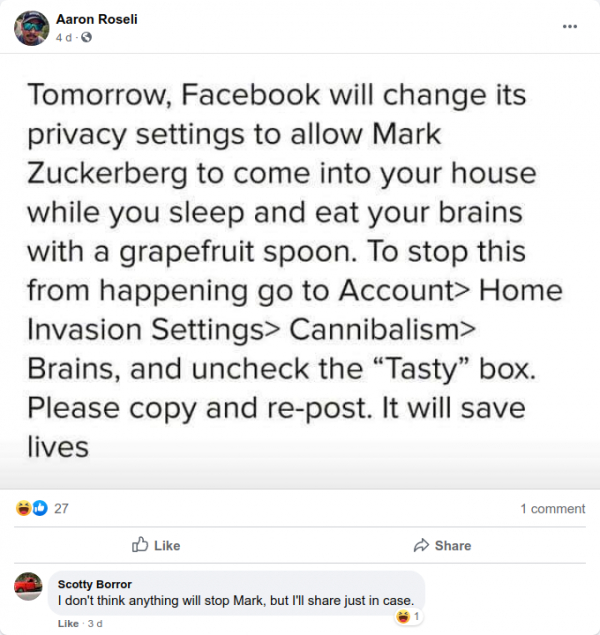Get in touch
Think that we can help? Feel free to contact us.
On Sunday I was mowing the lawn and had a “where are they now” moment. From the title of this post you can probably guess the “they” was an “it” and that “it” was a joke.
It wasn’t the best joke in the world, but it certainly connected with enough people to get shared all over the internet. Back then we called it “going viral”, but that phrase doesn’t feel right in 2020.
So, here’s my joke - posted on Facebook on the 28th of January 2011 to my friends:
Tomorrow Facebook will change it's settings to allow Mark Zuckerburg to come into your house while you sleep and eat your brains with a sharpened spoon. To stop this from happening go to Account> Home Invasion Settings> Cannibalism> Brainsssss and untick the "Tasty" box. Please copy and repost.
As I mentioned, it wasn’t the best joke in the world but it seemed to hit the spot between making fun of Facebook’s increasingly complicated and intrusive settings, while also making fun of people freaking out about said settings.
It was shared with my friends and that was as far as I expected it to go.
And then it started to turn up all over the place. My friends had shared it with their friends, who shared it with their friends, who… you get the picture…
It was shared on blogs, forums, meme sites, Twitter and even made it into a legal journal (page 107 of the NYU Ledger, if you’re interested). It was used in a few other articles about Facebook and privacy, unfortunately most of these have disappeared from the web.
First up - obviously I was chuffed that enough people liked my joke to share it across the internet.
But I also noticed that people were making changes:
Plus a myriad of other alterations.
Tracking the changes entertained me for a short while and then I forgot about my joke, but the internet didn’t. Every few years I’d remember the joke, wonder if it was still in circulation and a quick search would show it’s still doing the rounds.
But we’re 9.5 years on from my original post, surely it’s dead and buried by now?
Spoiler alert - it’s still going:

From a public post on Facebook from 1st August 2020.
Which is cool - but it got me thinking about whether I could track the joke’s evolution and spread across the internet.
What interested me is the joke only works if the audience is concerned about their online privacy / social media account settings. That it’s relevant almost 10 years after being made is slightly concerning.
Naively I thought I’d be able to easily search public posts on Facebook and somehow get enough data to plot the jokes popularity over time and its evolution into different strains.
[Hollow Laughter]
In 2020 the Facebook public post search is locked down, almost to the point of unusability. There is a Public Feed API from Facebook which (in theory) would give me exactly what I need, but:
“Access to the Public Feed API is restricted to a limited set of media publishers and usage requires prior approval by Facebook. You cannot apply to use the API at this time.”
This got me philosophising about the provenance of the content we generate - who owns it and where does it all go. In theory there are servers all over the world full of decades of internet activity, but how much of that is searchable, discoverable or accessible?
It also got me thinking about who this “limited set of media publishers” was and the irony of me trying to look through other people’s posts for a joke about online intrusiveness.
All of that aside I’d love to know if there’s a way of tracking this joke from its birth to present day. Something like the Google Trends service, but for Facebook. My theory is that the prevalence of this joke will spike with public concern about their privacy.
Which is why I’ve optimistically titled this post “Part 1”.
If you have a way to track this joke please email me - [email protected] - I’d love to hear from you.
Banner Photo by Raul Angel